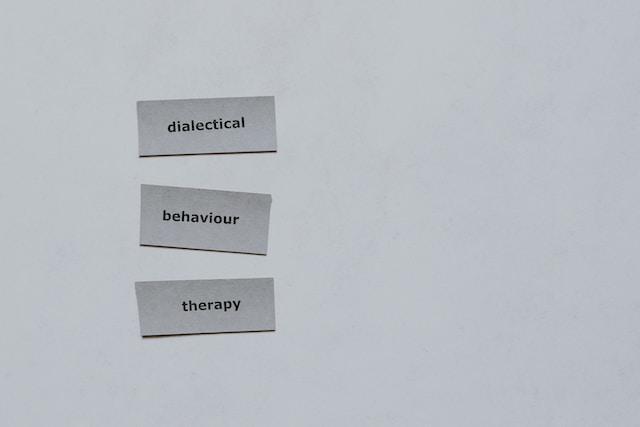Empowerment Through DBT London: Structure Strength, Searching For Balance
Empowerment Through DBT London: Structure Strength, Searching For Balance
Blog Article
Nurturing Emotional Resilience and Self-Awareness With Dialectical Behavior Therapy (Dbt) Solutions: Your Trip to Inner Tranquility
In the search of emotional durability and self-awareness, the use of Dialectical Behavior Treatment (DBT) services provides an organized approach that integrates different essential concepts to foster inner tranquility. Understanding the core tenets of DBT gives a solid structure for individuals looking for to navigate their emotional landscape with better clearness and control. By diving right into the intricacies of emotional policy, social efficiency, mindfulness methods, and distress tolerance strategies, one embarks on a transformative journey towards improved health and self-discovery. The path to internal peace through DBT solutions is not almost taking care of emotions however also about growing a much deeper connection with oneself and others, eventually resulting in a more unified presence.
Recognizing DBT Fundamentals
DBT is a restorative strategy developed by Marsha M. Linehan to assist individuals struggling with psychological dysregulation, usually connected with problems like borderline individuality disorder. Feeling law approaches help people identify and take care of extreme emotions effectively. By recognizing these essential aspects of DBT, people can cultivate psychological strength by learning to manage their feelings, navigate relationships, and deal with stressful scenarios more efficiently.
Creating Emotional Law Abilities

One key aspect of developing emotional regulation abilities is finding out to acknowledge and identify different emotions accurately. This self-awareness enables people to identify the source of their sensations and react appropriately (DBT London). In addition, practicing mindfulness techniques can aid individuals stay present in the minute and protect against frustrating emotions from hijacking their activities and ideas
Furthermore, executing healthy coping methods, such as deep breathing workouts, modern muscle mass leisure, or basing strategies, can offer people with effective devices to control their feelings throughout times of distress. By regularly exercising these abilities, individuals can develop a strong structure for emotional durability and self-awareness, eventually promoting internal tranquility and wellness.
Enhancing Interpersonal Efficiency


With a strong structure in emotional regulation skills, individuals can now focus on refining their interpersonal effectiveness to browse social communications with better ease and success. Interpersonal efficiency, a crucial part of Dialectical Behaviour Treatment (DBT), equips people with the essential tools to connect assertively, set boundaries, and construct much healthier connections. By discovering to reveal requirements and point of views clearly while appreciating the point of views of others, individuals can grow more significant links and decrease disputes in their interactions.
DBT emphasizes the relevance of efficient interaction, mentor people how to actively listen, validate others' sensations, and assert their own demands without being aggressive or passive. This capability allows individuals to browse tough conversations with self-confidence and empathy, fostering understanding and participation in their connections. Furthermore, by creating abilities to handle social disputes constructively, people can maintain much healthier boundaries, informative post advocate on their own, and negotiate concessions when differences develop.
Ultimately, boosting social efficiency via DBT encourages people to browse various social contexts with authenticity, durability, and compassion, promoting more meeting and harmonious connections in their lives.
Practicing Mindfulness Techniques

One basic mindfulness technique used in DBT is the "wise mind" idea, which urges individuals to incorporate their sensible and emotional minds to make well balanced decisions. This method try this enables individuals to browse psychological triggers with a calmer and more reasonable technique, lowering impulsive reactions. Furthermore, mindfulness techniques aid in basing individuals in the present moment, guiding them far from rumination on past events or anxiousness about the future.
Building Distress Tolerance Methods
To enhance psychological resilience in individuals undergoing Dialectical Practices Treatment (DBT), it is necessary to focus on structure effective distress resistance techniques. Creating these methods is crucial for individuals to navigate through tough circumstances without coming to be overloaded (DBT London). Distress tolerance skills aid individuals deal and withstand with intense feelings, crises, or circumstances where they might be lured to involve in dangerous habits
One key distress tolerance method often instructed in DBT is the ACCEPTS acronym, which represents Tasks, Contributing, Comparisons, Emotions, Pressing away, Thoughts, and Feelings. These abilities provide people with a tool kit of techniques to sidetrack themselves from traumatic feelings or scenarios in a healthy way.
In addition, learning just how to self-soothe with activities like deep breathing workouts, taking a cozy bath, or involving in pastimes can additionally aid build distress tolerance. By incorporating these techniques right into daily practice, people can much better handle stress and anxiety, regulate feelings, and inevitably cultivate a better feeling of emotional strength.
Conclusion
In verdict, the journey towards internal tranquility with Dialectical Practices Treatment (DBT) includes comprehending its fundamentals, creating emotional regulation abilities, enhancing interpersonal effectiveness, exercising mindfulness strategies, and structure distress tolerance approaches. By utilizing these methods, people can support emotional strength and self-awareness, causing a greater feeling of inner peace and health. Incorporating DBT services into one's life can offer important tools and resources for handling wikipedia reference emotions and connections effectively.
Recognizing the core tenets of DBT provides a solid foundation for people seeking to browse their emotional landscape with greater quality and control. By recognizing these basic facets of DBT, people can cultivate emotional strength by learning to handle their feelings, navigate connections, and cope with upsetting circumstances a lot more effectively.Mindfulness methods play an essential function in enhancing psychological guideline and promoting self-awareness in people going through Dialectical Practices Therapy (DBT)One essential mindfulness strategy used in DBT is the "sensible mind" concept, which encourages individuals to incorporate their sensible and psychological minds to make balanced decisions.To enhance emotional strength in individuals undertaking Dialectical Behavior Treatment (DBT), it is essential to focus on building efficient distress resistance methods.
Report this page